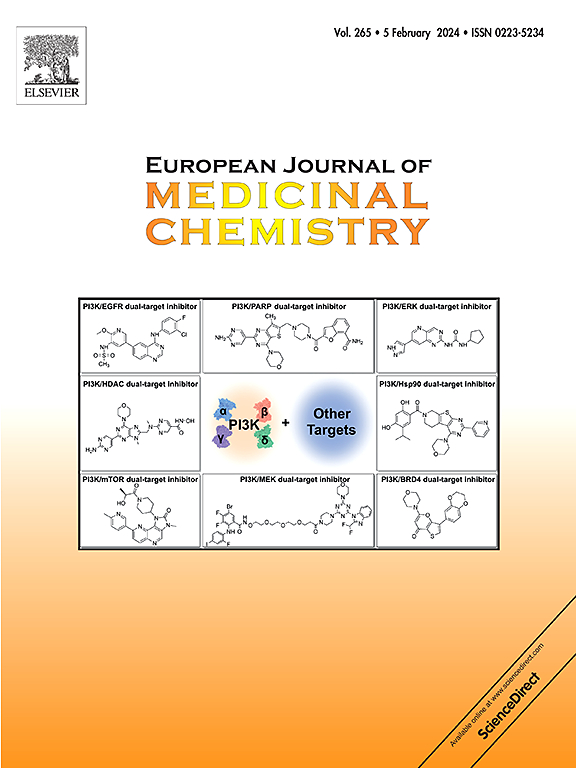Discovery of indane and naphthalene derivatives as USP7 inhibitors
IF 6
2区 医学
Q1 CHEMISTRY, MEDICINAL
引用次数: 0
Abstract
Protein deubiquitination via deubiquitinases is a crucial aspect of the dynamic modification of biomacromolecules. The deubiquitinase USP7 plays a key role in tumorigenesis through diverse pathways, thus representing a promising novel target for anti-cancer therapies. In this paper, in order to find novel USP7 inhibitors, a series of compounds scaffold-hopping from the reported USP7 inhibitor CP41 were designed, synthesized and biologically evaluated. Most of them exhibited certain inhibition against the in vitro USP7 enzyme activity. The most potent compounds (X12, X16, X21, X22 and X23) were highly selective for USP7 over a panel of other tested DUBs and showed significant in vitro inhibition against cancer cell proliferation. Interestingly, in RS4; 11 cancer cells, the selected compound X21 not only regulated the level of the extensively studied proteins (e.g. MDM2, p53, TRIM27) but also remarkably reduced the protein level of PCLAF, a key factor involved in TLS. In colon cancer animal models, X21 exerted in vivo anti-tumor efficacy, probably through synergistic effects of direct cytotoxicity and immune microenvironment improvement. These findings may provide directions for future design of novel USP7 inhibitors and facilitate the exploration of new mechanism of USP7 inhibitors.


茚和萘衍生物作为USP7抑制剂的发现
通过去泛素酶对蛋白质进行去泛素化是生物大分子动态修饰的一个重要方面。去泛素酶USP7通过多种途径在肿瘤发生中发挥关键作用,因此代表了抗癌治疗的一个有希望的新靶点。为了寻找新的USP7抑制剂,本文以已报道的USP7抑制剂CP41为基础,设计、合成了一系列支架跳跃化合物,并进行了生物学评价。多数对体外USP7酶活性有一定的抑制作用。最有效的化合物(X12, X16, X21, X22和X23)对USP7的选择性高于其他测试的DUBs,并显示出对癌细胞增殖的显著体外抑制作用。有趣的是,在RS4;11癌细胞中,所选择的化合物X21不仅调节了广泛研究的蛋白(如MDM2、p53、TRIM27)的水平,而且显著降低了参与TLS的关键因子PCLAF的蛋白水平。在结肠癌动物模型中,X21在体内发挥抗肿瘤作用,可能是通过直接细胞毒性和改善免疫微环境的协同作用。这些发现可能为未来新型USP7抑制剂的设计提供方向,并有助于探索USP7抑制剂的新机制。
本文章由计算机程序翻译,如有差异,请以英文原文为准。
求助全文
约1分钟内获得全文
求助全文
来源期刊
CiteScore
11.70
自引率
9.00%
发文量
863
审稿时长
29 days
期刊介绍:
The European Journal of Medicinal Chemistry is a global journal that publishes studies on all aspects of medicinal chemistry. It provides a medium for publication of original papers and also welcomes critical review papers.
A typical paper would report on the organic synthesis, characterization and pharmacological evaluation of compounds. Other topics of interest are drug design, QSAR, molecular modeling, drug-receptor interactions, molecular aspects of drug metabolism, prodrug synthesis and drug targeting. The journal expects manuscripts to present the rational for a study, provide insight into the design of compounds or understanding of mechanism, or clarify the targets.

 求助内容:
求助内容: 应助结果提醒方式:
应助结果提醒方式:


